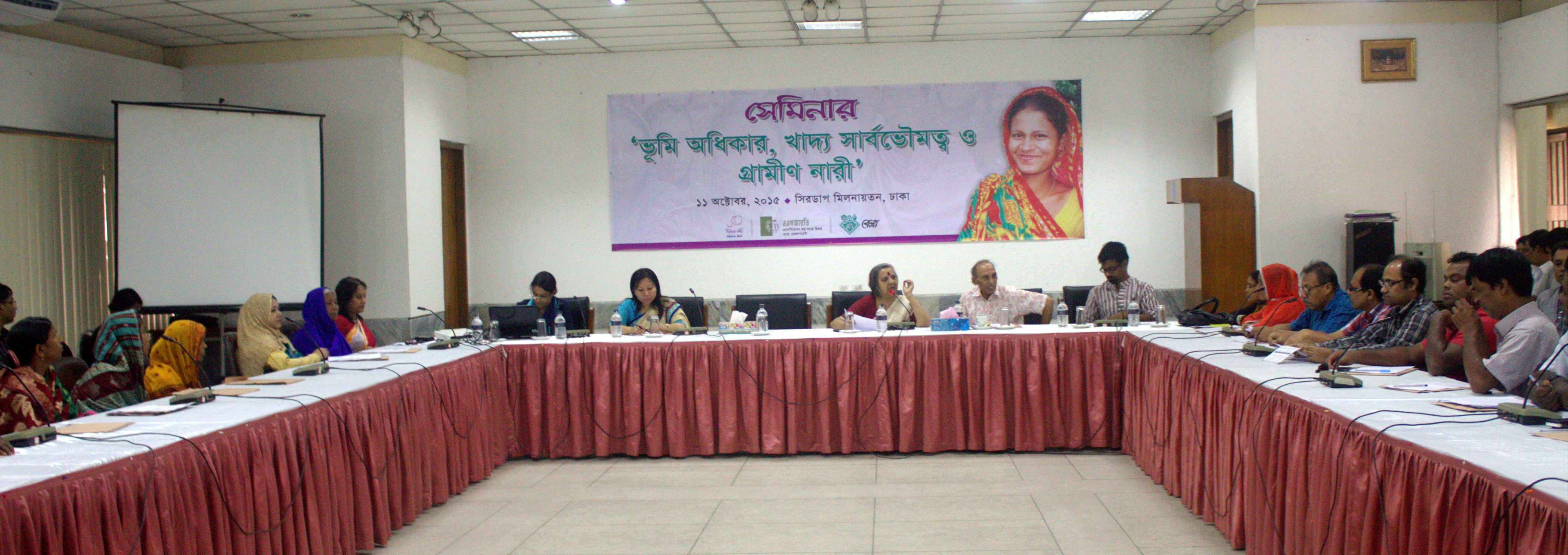Seminar on "Land Rights, Food Sovereignty and Rural Women" to celebrate the International Rural Women Day

Silent increasing of rural women participation and contribution in agriculture sector in Bangladesh is neglected by the state though they are changing their lives along with thousands other people by keeping traditional farming alive. Even they deprived from their institutional recognition as farmers, let alone in own farmlands, and still they have no access in the land. In the era of hybrid seeds, women farmers from rural Bangladesh are guardian of seed and biodiversity, food producer and agricultural labour also. In this context, to place the issue in the discussion table three rights based organization respectively Association for Land Reform and Development (ALRD), Nijera Kori and Bangladesh Environmental Lawyers Association (BELA) jointly organized a seminar on ‘land rights, food sovereignty and rural women’ at CIRDAP auditorium in Dhaka on 11 October 2015 in order to celebrate the International Day of Rural Women and acknowledge the effort, contribution and work of rural women in agriculture sector in Bangladesh. One hundred and twenty people encompasses professors, journalists, development activists, rights activists, women leaders, rural women farmers etc. were participated in the event.
Bangladeshi Women’s participation in farming, their contribution and lack of access to land was the main highlights of the event. A keynote paper was presented by the Advocate Syeda Rizwana Hassan, chief executive of BELA, emphasized on women role in food sovereignty, legal rights of women in access to land and its practices. While the panel discussants were Dr. Sadeka Halim, Professor of the University of Dhaka; Jotishi Chakma, Lecturer of the University of Dhaka; Amena Begum, leader of landless group from Subarna Char, Noakhali; Tapoti Rani Mondol, rural woman farmer from Paikgachha, Khulna; Hazera Begum, leader of Janashamabay (People’s Cooperative) form Faridpur; Pavel Partha, researcher of BARCIK, and Shamsul Huda, executive director of ALRD. The seminar was presided over by the rights activist Khushi Kabir, chairperson of ALRD.
Rights activists and rural women leaders made some observations at the seminar that women living in rural areas of Bangladesh are absolutely deprived of their justifiable rights to land and food despite their significant contribution to agricultural production and household works. They undertake farming activities from seed conservation to land preparation and from watering to harvesting; but they have no access in marketing, decision making process, government subsidy, technical information, credit, extension services, critical inputs such as fertilizers and water etc. So far in many cases we observed the financial institutions are reluctant to provide loans for women farmer. The seminar recommended providing loan in low-interest or on easy terms for rural farmer so that they can be more confident in producing.
Syeda Rizwana Hasan, in her keynote paper said women contributed 61% out of total agriculture in GDP of the country. But only 18 per cent women have effective ownership of land and 48 per cent have no land ownership when they are the half of the country’s population. She said that there would not be women empowerment in the country unless their rights to land ownership could be ensured. Most of the women living in rural areas suffered from malnutrition as they are deprived of their due rights to food, she added. She also referred a statistics form FAO that around 836 people suffer from malnutrition and 500 million of them are women.
In this event inspiring women such as, rural women leaders Topati Rani Mondol, Hazera Begum and Amena Begum came and shared their stories of struggles, challenges, obstacles and success against the land sharks and authorities of their area. Topati Rani Mondol demanded recognition of their hard works in the agricultural sector and said the women labours involved in agricultural sector get wage significantly lower than the male labours. Amena Begum had to fight her husband, to ensure her rights to own her land. Hazera Begum shared about her success in organic farming through practicing women cooperative. She was the example for other participating women how does the cooperative work effectively by collective efforts. Their inspiring stories were able to light a fire inside the participants and make them hopeful about their future.
Executive director of ALRD Shamsul Huda demanded low interest loan for the women living in rural areas and involved women farmers’ by improving their condition in the agricultural sector in the interest of better economic growth of the country.
To sum up the seminar Chair Khusi Kabir stressed the need for bringing change in the attitude of rural men towards the rural women to ensure the rights of women living in the rural area. She said there is still discrimination in the wage for the male and female workers while this should not exist.





